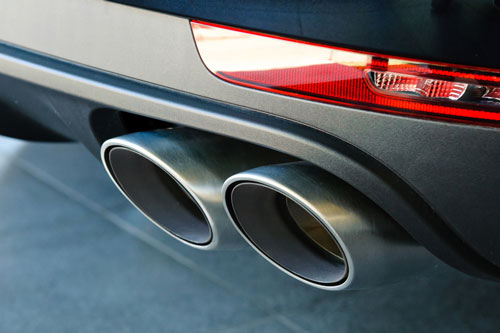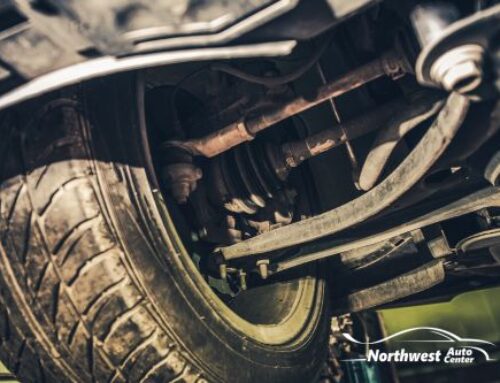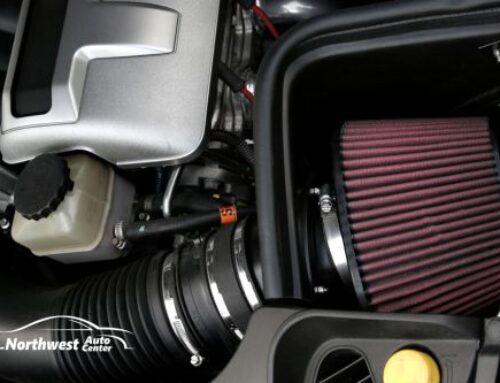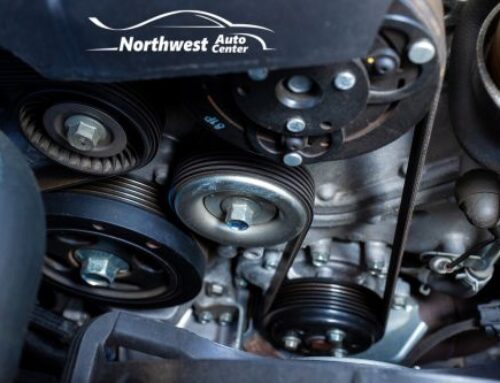Have you ever heard an unusually loud car and wondered why it made such a ruckus? Chances are the car has an aftermarket muffler or has a hole in the muffler/exhaust system—the muffler is essential to suppressing the loud sounds of a vehicle’s exhaust as it exits the car.
The name seems pretty fitting, right? A muffler muffles the sound.
Although Texas may not have a decibel regulation on the sound produced by vehicles, the southern state does have code on car mufflers. According to the Texas Transportation Code, “A motor vehicle shall be equipped with a muffler in good working condition that continually operates to prevent excessive or unusual noise.” It’s a good idea to know the ins and outs of your car’s muffler.
Let’s take a more in-depth look at how mufflers work.

How Does a Car Muffler Work?
A muffler is a cylindrical, metal part that attaches to the exhaust.
Your car’s engine works off of combustion, which can be quite noisy. As the exhaust funnels through a series of pipes, the sound becomes louder and louder. The car muffler filters out the noise from this process, making it possible to stand next to a car without damaging your ears.
If you were to look inside a muffler, you’d find a series of tubes and chambers. The components inside of a muffler are designed to reflect the sound waves into each other, ultimately canceling each other out. Let’s take a step-by-step look at how a muffler works.
- As the exhaust travels into the car muffler from the catalytic converter, it carries the sound waves from the engine. The exhaust has already been filtered for release back into the air, so it’s the muffler’s job to filter the noise.
- Next, the sound enters the muffler into the first expansion chamber through a pipe drilled with holes. Some of the sound exits the pipe through the holes and into the first chamber. The sound bounces off the walls, canceling each other out through molecular friction.
- Then, louder sound waves will bypass this perforated pipe and into a second even smaller chamber. Here, the sound bounces off the walls in the same process as the first chamber.
- The loudest sound waves are so potent that they will bypass the first two chambers and into the Helmholtz Resonator, which looks like a short tube. As the sound waves travel down this small tube, they bounce off the back end and back into each other. During this process, they also cancel each other out.
- The exhaust and any remaining sound will filter through the third chamber to cancel out any residual noise.
- Finally, the exhaust exits the car through the tailpipe.
How to Maintain Your Car Muffler
Mufflers don’t need as much inspection and maintenance as your oil or engine does. However, there are a variety of reasons that you could need to replace your muffler. Luckily, some symptoms tell you when it’s time to replace your car’s muffler.
-
Loud Exhaust
If you notice that your car sounds louder than usual, it could be a problem with the muffler. A car muffler is just like any other car part — the more it’s used, the more damage it sees.
-
Rattles
You may notice that there’s a rattling sound coming from your exhaust pipe. The noise may be coming from your muffler.
Your car sees damage from the natural elements. Mufflers are located on the rear, the underside of the vehicle, so they experience rain, snow, and dirt in a more up-close and personal way than other car parts. Moisture can cause rusting, creating holes in the sides of the muffler.
Give your muffler a good, clean spray after taking your car on muddy roads. It’ll thank you later.
-
Dropping Fuel Economy
A loose or damaged muffler can be the reason you’re not getting as many MPGs as you were before. When any part of the exhaust system isn’t functioning properly, it can cause the pressure inside the engine to drop. This changes the rate of combustion and can affect your fuel economy.
-
Exhaust Smell Inside Your Car
If you notice the smell of fumes inside your vehicle, take your car into your mechanic immediately. This means there could be a leak in the exhaust.
Inhaling exhaust fumes is dangerous for your health. Mild symptoms include dizziness, headaches, and fatigue. Don’t wait to bring your car in.
If you have any questions regarding your muffler or exhaust system and would like to have us inspect your exhaust system, please don’t hesitate. Give us a call at (281) 894-8880 Northwest Auto Center.
We’re always here to help!






Leave A Comment
You must be logged in to post a comment.